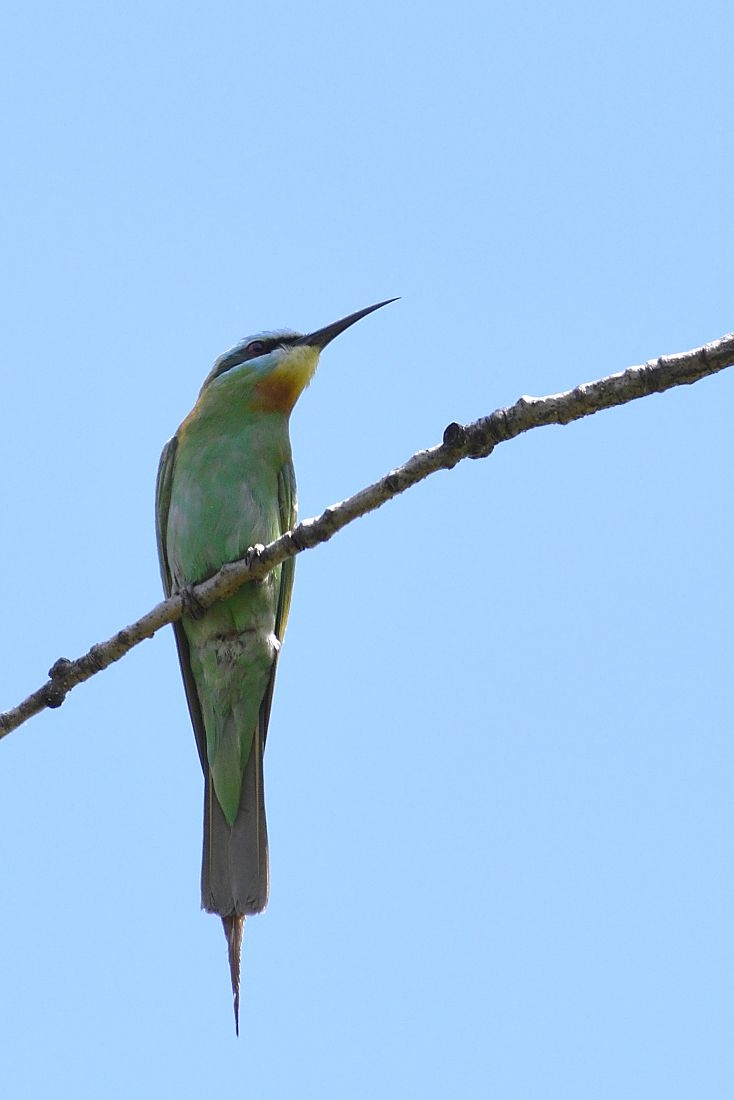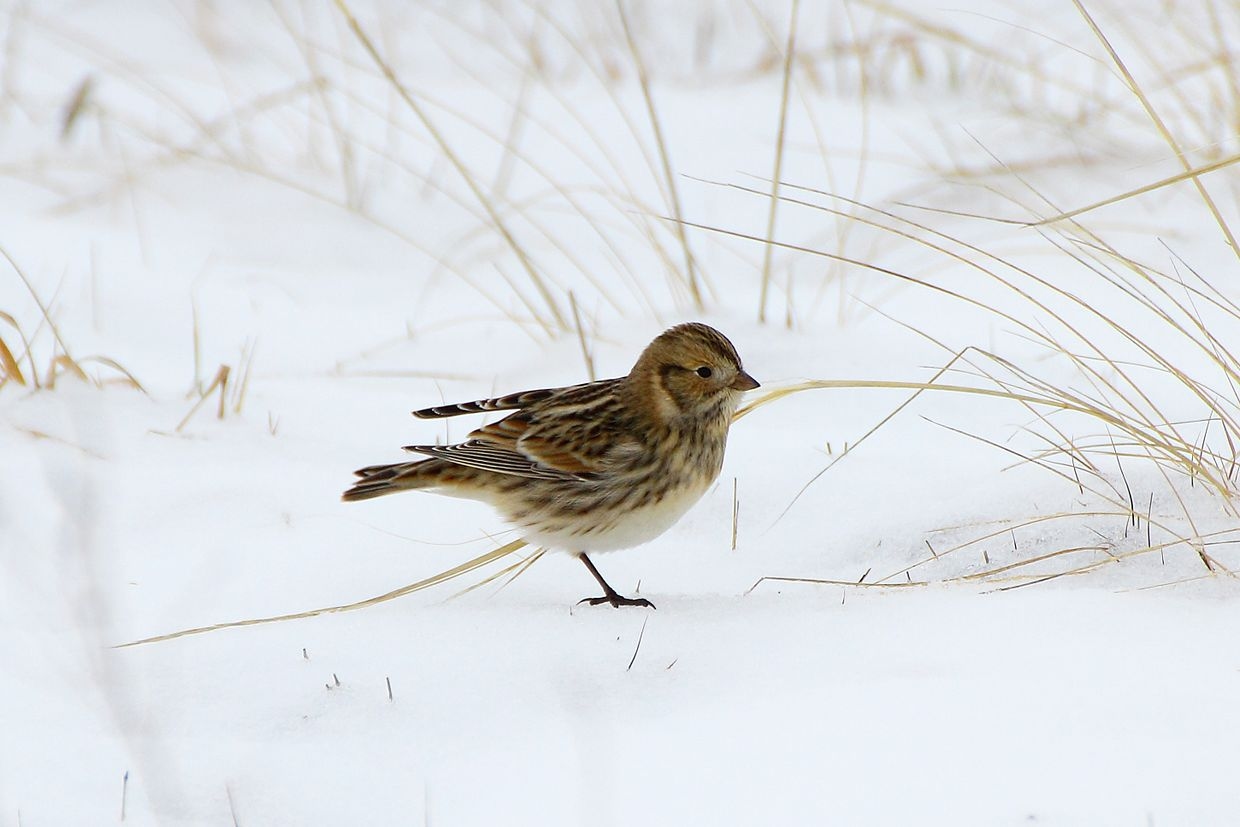Mistaken for spies: Ukraine’s bird watchers find comfort and destruction
While some in Ukraine face the skies to watch for missiles and air defense, Vlad Hedzyuk lifts his binoculars looking for the flutter of wings.
Hedzyuk, a biology student at Ivan Franko National University of Lviv, is a member of Ukraine’s small but dedicated bird-watching community and has grown accustomed to explaining that he’s not a spy.
“Especially in the first year of the war, people think that you are some kind of agent from Russia,” said Hedzyuk, who primarily watches birds in the western regions of Lviv and his native Rivne. “There are a lot of places where you cannot bird-watch, because you can’t go with a camera or binoculars where there are military sites. Sometimes you don’t even know where you can and cannot go.”
Bird-watching is still rare in Ukraine compared with other countries. In the U.K., hundreds of thousands of people participate in the Royal Society for the Protection of Birds annual bird-watching day. Meanwhile, active Ukrainian bird-watchers estimate their number in the hundreds.
“It’s like a bird-watching family,” said Hedzyuk. “If you don’t know someone in person, you’ve at least heard about them somewhere on social media, because you see their photos.”
For them, connecting with nature provides a reprieve from the psychological stress of war. A day of bird-watching might be looking through a window at backyard bird feeders, or traveling to other oblasts in search of new species to add to their “life list,” the list of birds they’ve identified in their lifetime. Some enthusiastic bird watchers have recorded seeing more than 300 species in Ukraine.
“There exists a lot of scientific research that shows nature, and birds in particular – listening to birdsong, for example – helps with literally everything,” said Nataliia Atamas, an ornithologist and researcher at the Institute of Zoology at Ukraine’s National Academy of Sciences. “That is, it helps stabilize the mental and psychological state.”
‘They build their bases, they scare the birds’
But even in the birding community, the effects of the war are inescapable. First, the already-small community has shrunk, as birders and bird researchers move abroad, or volunteer and fight on the front. Some have been killed since the war broke out. In a tight-knit community where members trade photos daily and sometimes stay at each other's houses when traveling to new bird habitats, each loss weighs heavy.
On top of devastating human losses, the full extent of the environmental consequences of the war will likely be unknowable for years.
Ukraine has yet to learn the full extent of natural losses from the war. Though covering only about 6% of Europe’s landmass, the country is thought to hold more than a third of Europe’s biodiversity. Ukraine’s ecosystems span forests, wetlands, grasslands, rivers, and mountains, and are home to more than 400 bird species.
Since the war broke out, severe forest fires have blazed up in combat areas, where missile launches and shelling ignite their surroundings. Many valuable habitats lie in the heart of heavy fighting, like the Azov-Black Sea coastline, where thousands of colonies of martins, terns, and other wetland birds nest and live, and protective nature parks remain closed due to occupation by Russia.
Atamas worries that birds who have nested there for centuries may disappear from the region because of long-term effects from the occupying forces.
“They build their bases, they scare the birds, they shoot there, they destroy the soil layer with their heavy equipment. This is very, very bad for the grassland,” said Atamas.


‘You no longer feel complete freedom’
Before the war, Oleksandr Ruchko hosted dozens of bird-watching tours every year as part of his tourism business. When he started more than two decades ago, the concept was so unfamiliar in Ukraine that some confused bird-watching tours for hunting trips, though he’s seen the hobby slowly expand since then.
Spring had traditionally been the height of birding season, when ecotourism groups or ornithological societies from Western Europe would partner with him to guide their members during migration season.
Now, in nearly two years of war, only five people have requested bird-watching tours – three Ukrainians and two foreigners.
“While we have a war, we have no customers,” Ruchko said.

Instead, the bird-watchers left in Ukraine are locals, like Oleksandr Nastachenko, who is one of a handful of bird-watchers still in Dnipropetrovsk Oblast, an eastern region that frequently comes under fire from Russian missiles.
Nastachenko is one of the country’s most prolific bird watchers. On the popular birding website eBird, he holds the record for most birds seen in Ukraine: 334, which he credits to venturing out every weekend for decades.
He stopped leaving the house when the full-scale invasion broke out in 2022, paralyzed by what he described as an “earthquake in his head” from watching the horrors of war in the news, but eventually returned to birding to find solace.
“The birds still bring a lot of joy,” he said. “But you no longer feel complete and absolute freedom.”
While he once traveled as far as Spain and Kazakhstan in search of unfamiliar species, now he can no longer leave the country because of the ban on military-aged men exiting Ukraine. Today, he rarely even leaves Dnipropetrovsk Oblast, fearing attacks on roads and bridges.
Areas of Kherson Oblast that he frequently visited are now heavily mined. His favorite spot is the Kinburn Spit, a thin stretch of land in the Black Sea which he had visited more than 30 times and seen in every season. It is currently under occupation by Russian forces.
“The demining process will take years, but of course the memory of the place will stay with me,” he said.
‘You have not been able to protect what is dear’
Even natural spaces far from the front are not immune to the war’s consequences. In an attempt to compensate for economic stresses of the fighting, Ukraine’s legislators have eased restrictions on deforestation. Attention, too, has shifted away from environmental protection, and scientific research has ground to a halt in many regions.


“When you work in one place for 20 years, 30 years, you know every stone there. And now you understand that it is all gone,” said Atamas, the ornithologist. “You have not been able to protect what is dear to you, and you will not be able to protect it.”
Atamas herself has been cut off from her lifelong research, where she studied birds by boat on the Dnipro River. Last year, she tried for months to get permission to continue her work in relatively safe areas, but she could not get a waiver from wartime restrictions on sailing in Ukraine’s bodies of water.
“Maybe in 20 years everything will be okay and we will sit down again, we will study how the fauna has changed and write papers titled ‘The Impact of Military Action…’,” said Atamas. “But the point is that you have to sit down and take scientific note of how your life was destroyed.”
For now, she has shifted her fieldwork to the Western Carpathian mountains, where she studies nests of black storks and large birds of prey. When she stands there among the birds, it is the only place she still feels calm.















